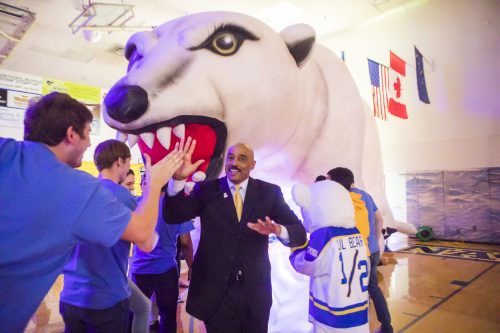Friday Focus: Developing the whole person and facilitating student success
December 12, 2019

— by Keith Champagne, vice chancellor for student affairs and athletics
For the past several years, the division of student and academic affairs at many major universities have been focused on student success and creating a seamless approach to student learning inside and outside of the classroom.
from the Northwest Commission on Colleges and Universities’ recent conference, which focused on facilitating students’ success.
At major public research and land grant universities, the divisions of student affairs have historically facilitated the development of the “whole person.” For example, when we focus on developing the whole person, we are going beyond knowledge and skills acquisition to incorporate other aspects of being a person in today’s society, such as emotional wellness, spiritual development, moral and ethical growth, community and civic engagement, and appreciation of diversity. Additionally, the 21st-century and modern whole person cannot be whole without an educated awareness of society and culture with which to contribute intellectually, socially, culturally, politically, economically and professionally in a real and ever-changing world.
At ĐÔÓűÉç the Division of Student Affairs — with its three-pronged approach of student development and success, enrollment management, and intercollegiate athletics — is excited to partner in a seamless manner with academic affairs; administrative services; rural, community and Native education; research and other areas of the university to facilitate students’ development, learning and success. We are excited and eager to continue to work with the schools’ and colleges’ deans to diminish student achievement gaps and enhance students’ learning and development outside of the classroom.
Moreover, creating experiential learning opportunities, experiences and environments have always been at the heart of student affairs work. In fact, the Center for Student Engagement currently employs the social change model for leadership development through the delivery of programs and services for students, and scaffolds developmental activities that help students learn to lead their lives, lead change among their peers, and lead systemic and global change.
The Residence Life unit develops and implements living-learning communities in partnership with schools and colleges to facilitate students’ personal and professional development in such areas as critical and strategic thinking, problem-solving, collaboration and leadership. Residents in these LLCs have opportunities to engage with other residents, participate in activities and events, and connect with faculty and staff in other areas of the Division of Student Affairs.
Conversely, we adhere to and utilize the following principles of good practice for student affairs as we strive to serve our students:
- Engage students in active learning.
- Help students develop coherent values and ethical standards.
- Set and communicate high expectations for student learning and success.
- Use systematic inquiry to improve student and institutional performance.
- Use resources effectively to achieve institutional missions and goals.
- Forge educational partnerships that advance student learning and success.
- Build supportive and inclusive communities.
Consequently, these principles of good practice for student affairs and the multiple student development, learning, retention, identity, career, race and cultural theories that guide and undergird our work are what will serve as our compass for continuing to meet the institution’s goals and the of facilitating students’ holistic development, learning and overall academic, personal and professional success at ĐÔÓűÉç. (The new standards take effect Jan. 1, 2020.)
Furthermore, to reiterate in the Division of Student Affairs, our core values and beliefs about higher education serve as the foundation for our commitment to the development of the whole person and student success; our collective professional values are derived from that commitment. Values evident across the history of student affairs work include an acceptance and appreciation of individual differences; experiential and lifelong learning; education for effective citizenship; student responsibility; ongoing assessment of learning and performance (students’ and our own); pluralism, multiculturalism, diversity and inclusion; ethical and reflective student affairs practice; supporting and meeting the needs of students as individuals and in groups; and freedom of expression with civility.
Student success at ĐÔÓűÉç is and continues to be influenced by the institution’s and students’ creating purposeful and meaningful goals to avail themselves of the unlimited academic, cocurricular and extracurricular learning activities, sessions, workshops and research resources available at this world-class major public research university.
Actually, we together — all of the divisions and areas — of the university are here for all of our students to ensure that they are in fact successful at all levels of the institution.
Friday Focus is a column written by a different member of ĐÔÓűÉç’s leadership team every week.


